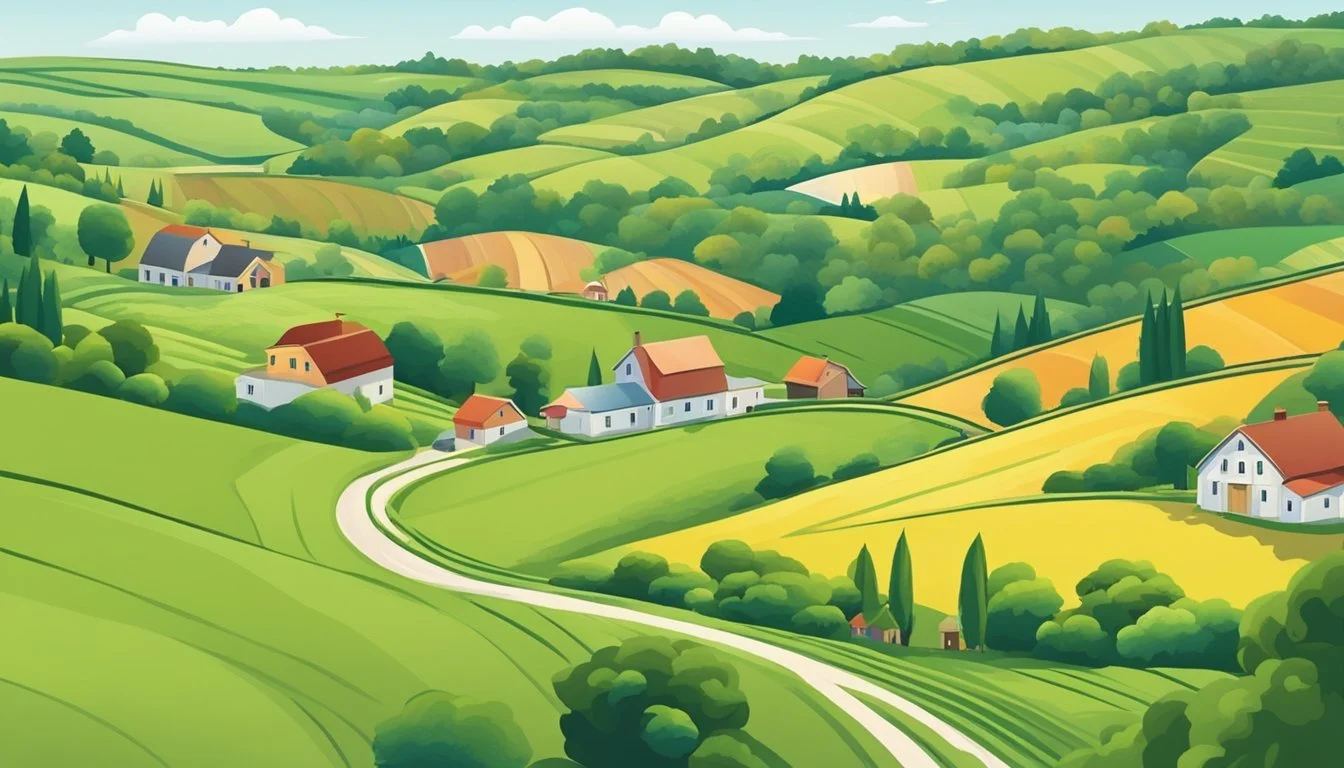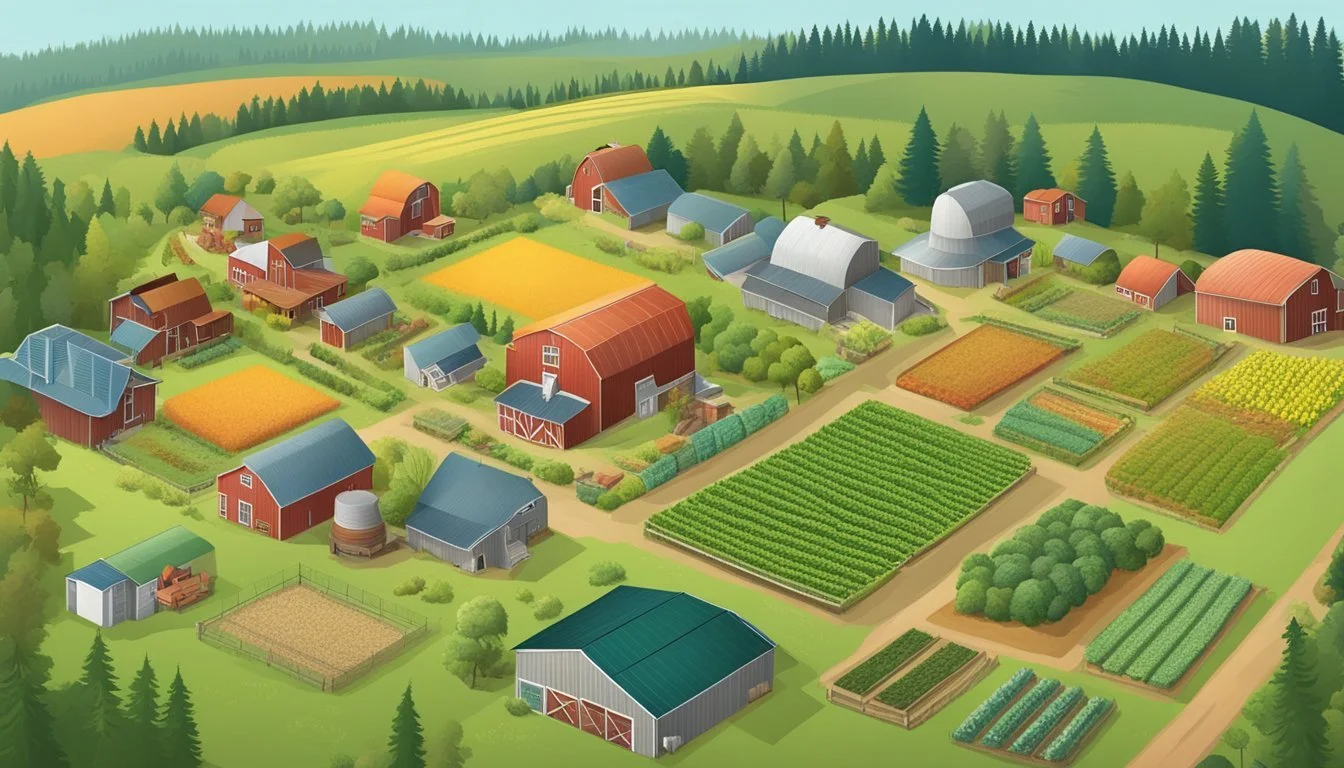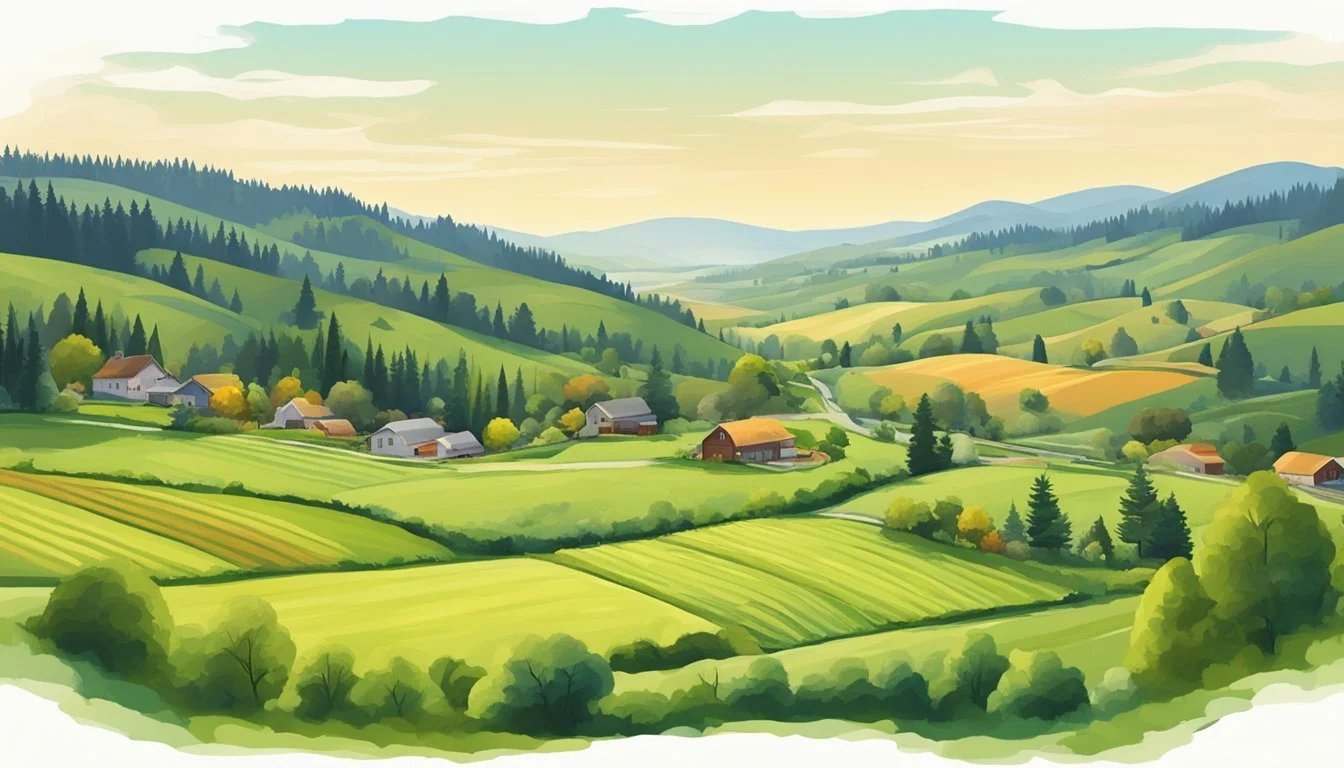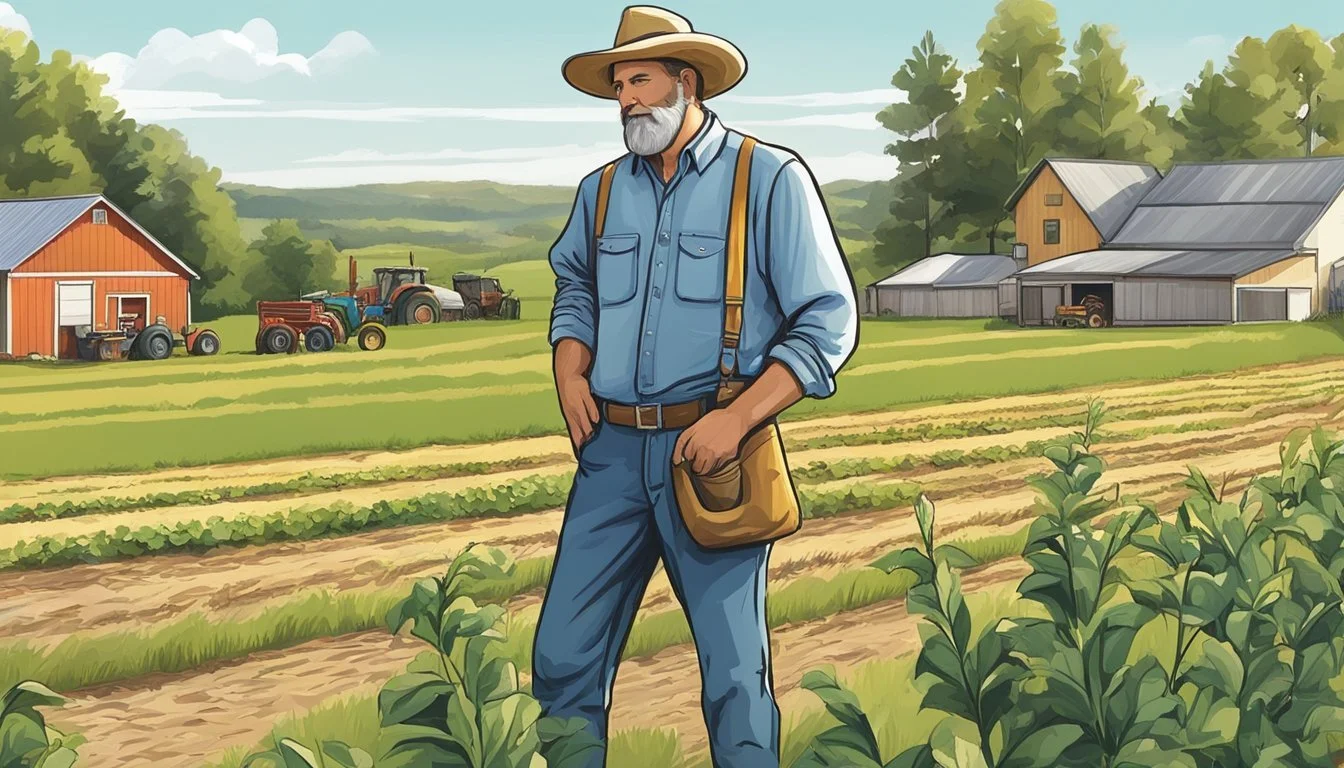Small Farms for Sale in Washington
Your Guide to Finding the Perfect Homestead
This Article is Part of State-by-State Guide to Buying Your First Small Farm
The state of Washington, with its diverse climate and abundant natural resources, offers an appealing market for prospective buyers seeking small farms. With a range of properties across various counties, from the rolling hills of Eastern Washington to the lush greenery of the Puget Sound region, the small farms for sale cater to a variety of agricultural needs. These properties often come with acreage suited for personal farming projects, hobby farms, or even commercial agricultural endeavors, each offering its own unique landscape and potential for cultivation.
Small farms in Washington provide an opportunity for individuals or families looking to engage in a rural lifestyle while being relatively close to the amenities offered by urban centers. Listings span a spectrum from modest homes with a few acres to larger expanses of land, some with existing infrastructure for farming operations. The diversity of Washington's small farms for sale allows for a broad range of agricultural activities, from organic vegetable gardens and orchards to pastures for livestock grazing.
With the agricultural sector contributing significantly to the state's economy, owning a small farm in Washington can be a worthwhile investment. Each property brings with it the chance to contribute to local food systems or to simply enjoy the rural lifestyle, all while being part of a state known for its strong support of local farming communities and sustainable practices. Whether in Okanogan County's expansive landscapes, Clallam County's coastal proximity, or the fertile soils of the Cascade Range region, small farms across Washington are ripe with potential for personal or commercial agricultural prosperity.
Understanding the Market
When exploring the market for small farms for sale in Washington, one must consider current real estate trends and the influence of acreage on listing prices.
Current Trends in Washington's Real Estate
Demand for Small Farms: In recent times, there's been a discernible uptick in the demand for small farms in Washington. This increased interest is predominantly driven by individuals seeking a rural lifestyle and entrepreneurs aiming to capitalize on the state’s vibrant local food movement.
Market Availability: Listings show a variety of property sizes, from 5-acre lots to larger 40-acre tracts, distributed across diverse regions like Okanogan, Clark, and Clallam counties. These offerings indicate a healthy availability of small farms catering to different buyer preferences.
Price Fluctuations: The real estate market for small farms in Washington experiences fluctuations. Factors such as location, accessibility, and land quality contribute to this variability in prices.
Impact of Acreage on Listing Price
Price per Acre: The price per acre is a critical metric in farm real estate. Smaller acreages often have a higher price per acre due to the economies of scale and the lower barrier of entry for buyers new to farming or seeking a manageable property size.
Acreage Example Listing Price Est. Price per Acre 5 acres $899,000 $179,800 22 acres $560,000 $25,455 40 acres $999,000 $24,975
Listing Price Variances: Farms with earlier listings around 6 months prior could exhibit a different price trajectory compared to those listed 10 hours ago. This time-based difference illustrates the dynamic nature of the real estate market within the region.
Acreage-Related Value: More extensive tracts of land might list at a lower price per acre but can lead to a higher overall listing price due to the total acreage offered. Buyers should be judicious when assessing the value proposition of a larger acreage vs. a higher per acre cost on smaller properties.
Types of Small Farms
In Washington, small farms cater to a range of agricultural interests, each with its unique characteristics and purposes. They appeal to diverse buyers, from those seeking a serene, rural lifestyle to others interested in intensive agricultural production on a smaller scale.
Hobby Farms
Hobby farms in Washington are often pursued for personal enjoyment or as a supplemental income source. They are typically small in scale and may include a mix of livestock such as chickens, goats, or even a few cattle, as well as garden spaces for growing fruits and vegetables. Owners of hobby farms usually balance farm work with other careers, but they may sell surplus produce at local markets or stands.
Rural Mini Farms
Rural mini farms consist of slightly larger land areas in comparison to hobby farms, providing owners with additional space for more robust agricultural practices. They are an excellent option for those interested in small-scale, commercial agriculture. Potential owners can find properties featuring various amenities, such as irrigation systems, established crop fields, or pastures ready for grazing.
Country Farmettes
Country farmettes are the bridge between personal pleasure and commercial viability. These small parcels of land, often ranging up to several acres, typically host a comfortable family home and enough space for small-scale agricultural projects. They offer potential owners the charm of country living with a manageable size for family-run operations, possibly engaging in specialty crops or having a small number of livestock.
Evaluating Property Size and Type
When looking for small farms for sale in Washington, prospective buyers should focus on both the size of the property and the type of farming it can support.
Assessing Property Size Needs
One must consider their operational needs and long-term goals when determining the appropriate property size. Small farms in Washington can range significantly in size - from 5-acre hobby farms to larger, 40-acre plots that can support more extensive farming operations. For instance, a 5-acre property in Clallam County may suffice for a family looking to practice sustainable living, while a 40-acre farm in Clark County might be oriented towards commercial production.
Choosing the Right Type of Farm
Different types of farms require different facilities and land characteristics. Buyers need to consider not only the current state of the land but also its potential. For example, a 16.5-acre property in King County equipped with a large residential structure might suit those looking to combine farming with hospitality ventures. In contrast, more extensive acreage, such as the 389.6-acre lot in Republic, WA, could support a variety of agricultural practices, including livestock and extensive crop farming. Here’s a concise way to categorize potential farm types:
Hobby Farms: Often smaller than 10 acres and may include a modest residential area.
Commercial Farms: Typically larger, possibly including multiple structures for storage, livestock, and crop management.
Specialized Farms: These could range in size and focus on specific types of production, like orchards or vineyards.
Property buyers should assess both size and type according to their intended use to find the most suitable small farm in Washington.
Financial Considerations
When considering the purchase of a small farm in Washington, the key financial aspects buyers need to focus on are the purchase price of the property and the price per acre.
Calculating Purchase Price
The purchase price of a small farm in Washington can vary widely depending on factors such as location, infrastructure, and land quality. Listings can show a vast range from as low as $50,000 to upwards of $2 million. The purchase price is influenced by the size of the property, existing facilities like barns and homes, and the type of land—whether it's tillable, pasture, or woodland.
Understanding Price per Acre
The price per acre is a critical metric when evaluating farm real estate as it allows for a direct comparison between properties of different sizes. In Washington, prices per acre can fluctuate greatly, with an average that might exceed $5,500. Buyers should consider the following:
Current Land Use: Agricultural vs. potential developmental use.
Location: Proximity to markets and urban centers.
For example, farmland intended for intensive farming like orchards might have a higher price per acre due to its improved soil quality and existing irrigation infrastructure compared to grazing land.
Agricultural Potential
Washington's diverse climate and rich soil make it ideal for a range of agricultural pursuits on small farms. Land for sale typically ranges from a few to several dozen acres, providing ample space for specialized crop production and livestock farming.
Suitable Crops for Small Acreages
In Washington, small acreages can successfully support high-value specialty crops. Commonly grown are:
Fruits: Apples, cherries, and berries thrive in the region, making use of smaller plots for concentrated yields.
Vegetables: Leafy greens, root vegetables, and legumes perform well, benefiting from the state's favorable growing conditions.
Livestock Farming on Small Farms
Small farms in Washington are conducive to raising various types of livestock:
Goats and Sheep: They require less acreage than cattle and can be raised for milk, meat, or fiber. Smaller parcels of land often provide sufficient grazing.
Poultry: Chickens, ducks, and turkeys are well-suited to small farm environments, contributing to the farm's diversity with egg or meat production.
The Buying Process
Purchasing a small farm in Washington involves a series of strategic steps to ensure buyers make informed and effective decisions. From sourcing the right listings to evaluating land quality and finalizing the deal, each phase is crucial to acquiring a suitable property.
Searching for Listings
Buyers should start by harnessing resources like online platforms, real estate agents, and local listings to find suitable small farms for sale. They must prioritize listings that align with their desired location, size, and budget. It is important to use multiple sources to compile a comprehensive list of potential properties.
Online Platforms: LandSearch and LandWatch are valuable for discovering available properties.
Real Estate Agents: Specialists in rural properties offer insights into listings not widely advertised.
Evaluating Land Quality and Potential
Once buyers have compiled a list of potential farms, they should carefully consider the quality of the land and its potential for fulfilling their farming goals.
Soil Quality: Test for fertility and suitability for the intended agricultural use.
Water Resources: Confirm the availability and rights pertaining to water sources.
Infrastructure: Assess the condition of existing structures and the cost of any needed improvements.
Buyers must ensure the land meets their needs and local agricultural regulations.
Finalizing the Sale
Concluding the acquisition of a small farm entails a thorough inspection, financial due diligence, and the navigation of legal requirements.
Inspection: Hire professionals to inspect the property for structural, environmental, and legal issues.
Financial Verification: Confirm that financing is in place and understand the full cost implications, including taxes and fees.
Legalities: Work with a real estate attorney to review contracts, zoning laws, and title deeds.
By adhering to these steps, buyers can proceed to close the deal with confidence, knowing they have conducted proper due diligence.
Legal and Zoning Considerations
When purchasing a small farm in Washington, it is crucial for buyers to be well-informed about local zoning restrictions and regulatory requirements. These parameters dictate permissible agricultural practices and land uses that directly impact farm operations.
Understanding Zoning Restrictions
Zoning codes are centrally important in the land purchasing process. They are typically available on county websites and outline what activities are permissible in a designated area. Here's a brief overview to guide potential buyers:
Agricultural Zoning: Land designated for farming typically allows for the cultivation of crops and raising livestock. It may restrict the size and type of structures allowed.
Rural Residential Zoning: This may allow for some farming activities but also include residential land use with potential restrictions on the scale of farming operations.
Potential buyers should check with the local planning department to understand the specific zoning classification of the property they are interested in. Zoning laws can affect everything from the types of crops grown to the construction of farm buildings and the processing of agricultural products.
Navigating Regulatory Requirements
In addition to zoning, there are various regulatory requirements that must be considered:
Environmental Regulations: Washington State has regulations concerning soil conservation, water rights, and water quality. Prospective buyers should contact the local Conservation District for guidance on implementing best practices and for assistance with soil testing.
Grants and Incentives: Knowledge of available grants and incentive programs can provide necessary support for sustainable farm practices and land development. The Conservation District may also offer support in this area, including project grants and loans for equipment.
Compliance is essential to avoid costly fines and legal issues. Buyers are encouraged to thoroughly investigate these requirements during the due diligence phase to ensure the property meets their needs and regulatory obligations.
Preparing for Farm Ownership
Prior to taking the leap into farm ownership, a prospective buyer must address two critical components: building a solid infrastructure and creating a comprehensive business plan. These steps are foundational for long-term success and sustainability.
Building Infrastructure
The infrastructure of a small farm encompasses several physical and logistical aspects. Key infrastructure elements include:
Water sources: Establishing reliable water access points for irrigation and livestock.
Fencing and enclosure: Defining property boundaries and securing areas for animals or crops.
Storage and shelter: Building barns, silos, and other necessary storage units to protect equipment, feed, and harvests.
Energy and utilities: Ensuring access to electricity and possibly alternative energy sources, like solar panels, for operational efficiency.
Creating a Business Plan
A business plan serves as a roadmap for the farm's operation, growth, and financial management. The following points are crucial in a small farm business plan:
Executive Summary: An overview of farm goals and the planned approach to reach them.
Market Analysis: Research on local demand, competition, and pricing strategies.
Operational Plan: Detailed information on farming practices, equipment needs, and labor requirements.
Financial Projections: A breakdown of expected expenses, revenues, and profitability over time.
Developing a thorough business plan not only guides a new owner's decision-making process but also is instrumental in securing loans or investments for the farm.






